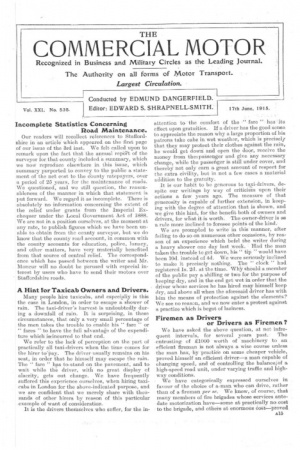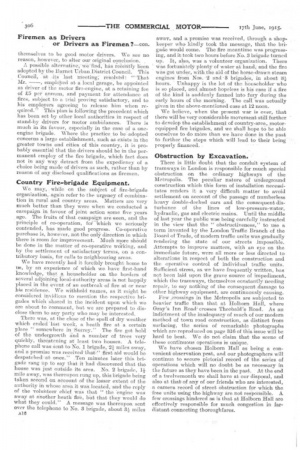Incomplete Statistics Concerning Road Maintenance.
Page 1

Page 2

If you've noticed an error in this article please click here to report it so we can fix it.
Our readers will recollect references to Staffordshire in an article which appeared on the first page of our issue of the 3rd inst. We felt called upon to remark upon the fact that 'the annual repat of the surveyor for that county included a. summary, which we now reproduce elsewhere in this issue, which summary purported to convey to the public a state,ment of the net cost to the County ratepayers, over a period of 25 years, for the maintenance of roads. We questioned, and we still question, the reasonableness of the manner in which that statement is put forward. We regard it as incomplete. There is absolutely no information concerning the extent of the relief under grants from the Imperial Exchequer under the Local Government Act of 1888. We are not in a position ourselves, at the moment at any rate, to publish figures which we have been unable to obtain from the county surveyor, but, we do know that the county road account, in common with the county accounts for education, police, lunacy, and other matters, have very materially benefited from that source of central relief. The correspondence which has passed between the writer and Mr. Moncur will no doubt be perused with especial interest by users who have to send their motors over ' Staffordshire roads.
A Hint for Taxicab Owners and Drivers.
Many people hire taxicabs, and especi,aliy is this the case in London, in order to escape a shower of rain. The taxi-driver's harvest is undoubtedly during a downfall of rain. It is surprising, in these circumstances, that only a very small percentage of the men takes the trouble to enable his " fare " or " fares "-to have the full advantage of the expenditure which. isiineurred to that end.
We refer to the lack of perception on the part of practically all taxi-drivers when the time comes for the hirer to'Pay. The driver 'usually remains oh his seat, in order that he himself may escape the rain. The " fare " has tostand on the pavement, and to wait while the driver, with no great display of alacrity, gets out change. We have frequently suffered this experience ourselves, when hiring taxicabs in London for the above-indicated purpose, and we are confident that we merely share with thensands of other hirers by reason of this particular .example of want of consideration.
It is the drivers thentiSelves Who Coffer, for the in attention to the comfort of the " fare " has its effect upon gratuities. If a driver has the good sense to appreciate the reason Why a large proportioia of his patrons take cabs in wet weather, which is precisely that they may protect their clothes against the rain, he would get down and open the door, receive the money from thei,passenger and give any necessary change, while the passenger is still under, cover, and thereby not only earn a great amount of respect for the extra civility, but in not a few cases a material addition to the gratuity.
It is our habit to be generous to tazi-drivers, despite our writings by way of criticirn upon their actions a few years ago. The measure of that generosity is capable. of further extension, in keeping with the degree of attention that is shown, and we give this hint, for the benefit both of owners and drivers, for what ibis worth. The' owner-driver is as 'a rule more inclined to foresee points of the kind..
We are prompled to write in this manner, after failing to do so on numerous other occasions, by reason of an experience which befel the writer during a heavy shower one day last week. Had the man taken the trouble to get down, his" tip "would have been 10d, instead of 4d. We were seriously inclined to make it precisely nothing. The " clock " had registered is. 2d. at the time. .why should a member of the public pay a shilling or two for the purpose of keeping dry, and in the end get wet inorder that the driver whose services he has hired may himself keep dry, and above all when the aforesaid driver has with .him the means of protection against the elements ? We see no reason, and we now enter a protest against a practice which is begot of laziness.
Firemen as Drivers or Drivers as Firemen ?
We have asked the above question, at not infrequent intervals, for several years past. The entrusting, of 1000 worth of machinery to an efficient fireman is not 'always a wise course unless the man has-, by practice on some .cheaper vehicle, proved himself an efficient driver—a man capable of changing speed, and of Controlling the balanceiof a high-speed road unit, under varying traffic and highway conditions.
We have categorically expressed ourselves in favour of the choice of a,man who can drive, rather than of a fireman per $e. We bow, of eourse; that many members of fire brigades whose services antedate motorization have—some at practically no cost to the brigade, and others at enormous C.ostproved themselves to be good motor drivers. We see no reason, however, to alter our original conclusion. , A possible alternative; We-find,has reentry been adopted by the Barnet Urban,District Council. This Council, at -its last Meeting; resolvSel: "'That Mr. -, employed at a local garage, be appointed as driver of the motor fire-engine, at a retaining fee of 5 per annum, and payment for attendance at fires, subject. to a trial proving satisfactory, and to his employers agreeing to release him when required." This plan is following the precedent which has been set by other local authorities in respect of stand-by drivers for motor ambUlances. There is much in its favour, especially in the case of a oneengine brigade. Where the practice to beia.dopted concerns a large establishment, such as exists in the greater towns. and cities of this country, it is probably essential that the drivers should be in the permanent employ of the fire brigade, which fact does not in an way .detract from the expediency of a choice being made of drivers as such, rather than by reason of any disclosed qualifications as firemen.
Country Fire,-brigade Equipment.
We may., while on the subject of fire-brigade organization, again refer to the urgency of combination in rural and country areas. Matters are very much better than they were when we conducted .a campaign in favour of joint action some five years ago. The fruits of that campaign are seen, and the principle of co-operation, foi' ivhich we. seriously contended, has made good progress. Co-operative purchase is, however, not the onlY direction in which there is room .for improvement. Much more should be done in the matter of co-operative working, and by the settlement of satisfactory terms, on a contributory basis, for calls to neighbouring areas.
We have recently had it forcibly brought home to us, by an .experience of which we have first-hand knowledge, -that, a householder on the borders of several adjoining local-authority areas is not happily placed in the,event of an outbreak of fire at or near his residence. We withhold names, as it might be considered invidious to mention the respective brigades which shared in the incident upon which we are about to 'comment, but we are prepared to disclose them to any party who may be interested.
There was, at the close of the spell of dry weather which ended -last week, a, heath fire at a certain place " somewhere in:Surrey." The fire got hold of the undergrowth and a. number of trees very quickly, threatening at least two houses. A telephone call was Sent to No. 1 brigades 2+ miles away, and a promise was receivedethat.":first .aid would ha d.espatchedeat once." .Ten minutes later this brigade rang Up to say that it had discovered that the house was just outside its area. No. 2 brigade, lf mile away, was thereupon rung up, this brigade being taken second on account of the leaser extent of the authority in whose area it was.located,• and the reply of the volunteer chief was that " the 'engine was away at another heath fire, but that they would do what they could." A message was thereupon sent over the telephone to No. 3 brigade, about 3f miles AB5 away, and a promise was received, through a. shopkeeper who kindly took the message, that the brigade, would come. The fire meantime was progressing, and it took two hours before No. .3 brigade turned up. It, also, was a volunteer organization. There was fortunately -plenty of water at hand; and the fire WM got under, with the aid of the horse-drawn steam engines from Nos. -2 and -3 brigades, in about hours. Unhappy is the lot of the householder who is so placed, and almost hopeless is his case if a fire of the kind is suddenly fanned into fury during the early hours of the morning. The call wasactually given in the above-mentioned case at 12 noon.
We believe, when the present war is over, that there will be very considerable movement still further to develop the establishment of country-area, motorequipped fire brigades, and we shall hope to be able ourselves to do more than we have clone in the past to further the steps which will lead to their being' properly financed.
Obstruction by Excavation.
There is little doubt that the conduit system of tramways. in London is responsible for much special obstruction on the ordinary highways of the Metropolis. The peculiar nature of underground construction which this form of installation necessitates renders it, a very difficult matter to avoid settlement on account of the passage of numberless heavy double-decked cars and the consequent disturbance of the lines of low-pressure-water, hydraulic, gas and electric mains. Until the middle of last year the public was being carefully instructed in the view that the " obstructiveness," to use a term invented by the London Traffic Branch of the Board of Trade, of modern traffic units was gradually rendering the state of our streets impossible. Attempts to improve matters, with an eye on the immediate future., were all more or less directed to alterations in respect of both the construction and the operative control of individual traffic units. Sufficient stress, as we have frequently written, has not. been laid upon the grave source of impediment. which the tramways, themselves constantly needing repair, to say nothing of the consequent damage to other highway equipment., are continuously causing.
Few ,crossings in the Metropolis are subjected to heavier traffic than that at Holborn Hall, where Gray's Inn Road crosses Theobald's Road. As an indictment, of the inadequacy of much of our modern method of town road construction, as distinct from surfacing, the series of remarkable photographs which are. reproduced on page .316 of this issue will be hard to beat. We do not claim that the scene of these continuous operations is unique.
We have chosen Holborn Hall as being a convenient observation posts and our photographers will continue to secure pictorial record of the series of operations which will no doubt be as necessary in the future as they have been in the past. • At the end of a twelvemonth we shall have at our disposal, and also at that of any of our friends who are interested, a camera record of street obstruction for which the free units using the highway are not responsible. A few crossings hindered as is that at Holborn Hall are effectively responsible for much congestion in fardistant. connecting thoroughfares.






















